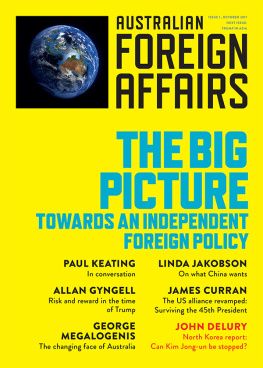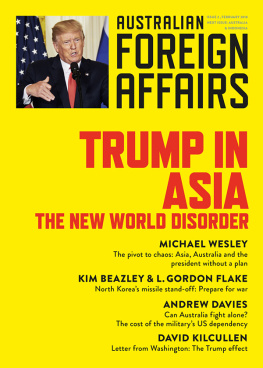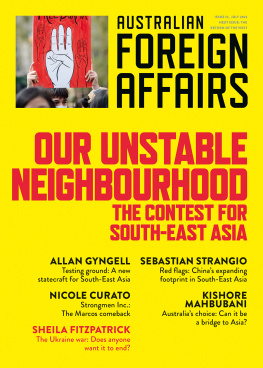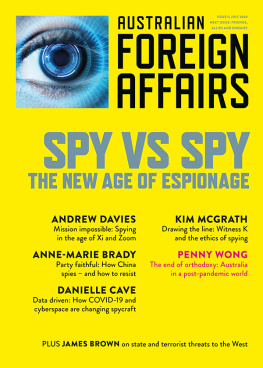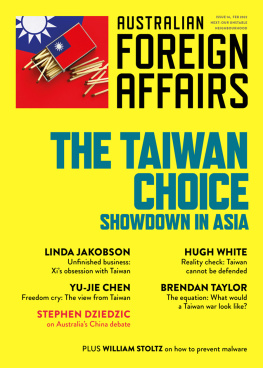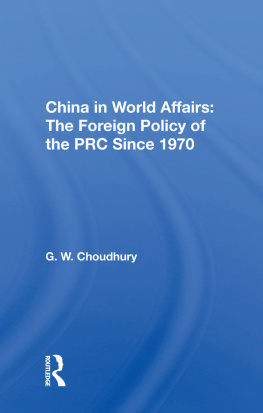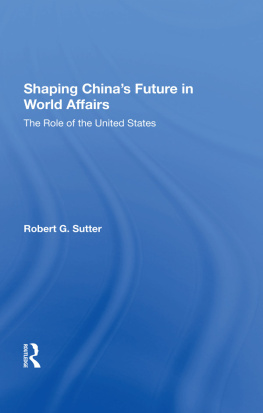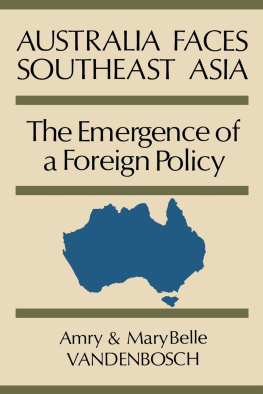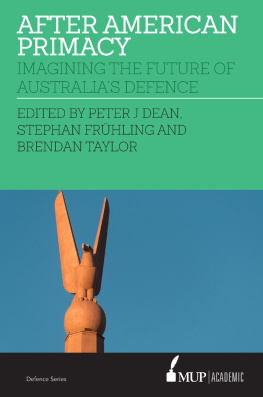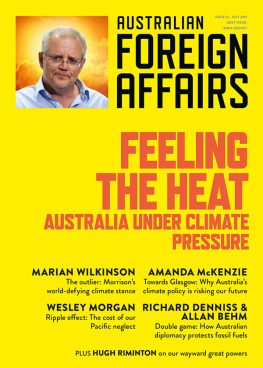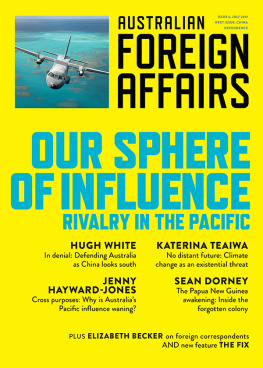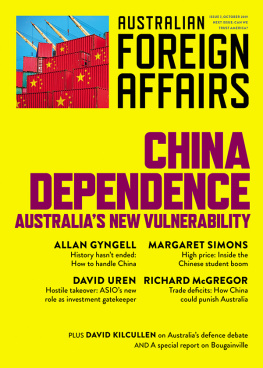Contributors
Rowan Callick is China correspondent for the Australian.
Jo Chandler is a freelance journalist and an educator at the University of Melbourne Centre for Advancing Journalism.
James Crabtree was the Financial Times bureau chief in Mumbai.
James Curran is a professor of history at the University of Sydney and non-resident fellow at the Lowy Institute for International Policy.
John Delury is associate professor of Chinese studies at Yonsei University.
Richard Denniss is the chief economist at the Australia Institute.
Allan Gyngell is an honorary professor at the ANU.
Linda Jakobson founded China Matters, a public policy initiative.
Paul Keating served as prime minister of Australia from 1991 to 1996.
Hamish McDonald is world editor for the Saturday Paper.
Thomas Meaney is a fellow at the Einstein Forum in Potsdam.
George Megalogenis is a journalist, political commentator and author.
Australian Foreign Affairs is published three times a year by Schwartz Publishing Pty Ltd. Publisher: Morry Schwartz. ISBN 978-1-76064-0279 ISSN 2208-5912 ALL RIGHTS RESERVED. No part of this publication may be reproduced, stored in a retrieval system, or transmitted in any form by any means electronic, mechanical, photocopying, recording or otherwise without the prior consent of the publishers. Essays, reviews and correspondence retained by the authors. Subscriptions 1 year print & digital auto-renew (3 issues): $49.99 within Australia incl. GST. 1 year print and digital subscription (3 issues): $59.99 within Australia incl. GST. 2 years print & digital (6 issues): $114.99 within Australia incl. GST. 1 year digital only: $29.99. Payment may be made by MasterCard, Visa or Amex, or by cheque made out to Schwartz Publishing Pty Ltd. Payment includes postage and handling. To subscribe, fill out and post the subscription card or form inside this issue, or subscribe online: Editor: Jonathan Pearlman. Associate Editor: Chris Feik. Consulting Editor: Allan Gyngell. Deputy Editor: Kirstie Innes-Will. Management: Caitlin Yates. Marketing: Elisabeth Young and Sophie Shanahan. Publicity: Kate Nash. Design: Peter Long. Production Coordinator: Hanako Smith. Typesetting: Tristan Main. Cover image by MarcelClemens, Shutterstock.
Editors Note
THE BIG PICTURE
P utting aside the presumption that this nation or any nation has an easily defined identity, it is an interesting exercise to revisit the conclusion drawn by Australias longest-serving prime minister as he described the thing which sticks firmly in the mind of the average Australian.
This was 1935 and Robert Menzies, then the attorney-general, was visiting London. He was speaking against the backdrop of rising despotism and fascism and he had a comforting message for his audience at Chatham House. The thing that was firmly stuck in the mind of every Australian, he explained, is that he is entirely British.
It quickly emerged that this claim was less firm than it appeared and, within a decade, it came unstuck. War erupted, Canberra turned from London to Washington, and the imperial bonds loosened.
The world changed, and Australia changed with it.
Eighty-two years later, there is no shortage of foreseeably seismic foreign events that could require the nations direction and outlook to change, or be changed. Significantly and more so than at any other time in Australias recent history these challenges are occurring close to home: tensions in the South China Sea, North Korean nuclear missiles, the impact of climate change, Chinas rise and assertiveness, risks in the financial system, the appeal of illiberal populism.
It is still unclear whether these challenges will transform the national character and turn Australias current attempts at self-definition a US-allied middle power with an egalitarian bias, a migrant nation edging closer to Asia into a quaint relic of history. But it is clear that the responses will require debate, assertiveness and creativity, and an attempt to understand Australias evolving character and its place in the region and in the world.
It is this challenge that Australian Foreign Affairs will attempt to meet, both in this first issue and beyond. The publication will be independent and nonpartisan and will feature leading experts and writers from Australia and around the world. It will take a broad view of foreign affairs, covering trade, economics, security, history, culture and the environment as well as politics. Its articles will explore Australias place in the world, while testing and challenging assumptions.
This first issue addresses the nations most significant changes and challenges including Australias own changing population and considers a range of possible outcomes and responses.
The extent to which Australia has operated independently of its two great power allies, Britain and then the United States, remains a matter of debate a debate that is increasing in importance, as Australia prepares for a region in which postwar certainties are fading.
The big picture for Australia is being shaped not just by Donald Trump, Xi Jinping and Kim Jong-un but also by the decline of the US-backed postwar liberal order. The stakes are plainly high; the consequences remain uncertain.
Against this backdrop of threat and opportunity, Australias foreign affairs and the ability to develop clever and informed responses will determine not only the countrys future and prosperity but the claims that can be made about the nations character.
Jonathan Pearlman
PAUL KEATING IN CONVERSATION
We need to determine
a foreign policy
of our own
The following transcript is based on two interviews with Paul Keating, conducted by Professor Nick Bisley and Dr Michael Fullilove in April 2017.
Nick Bisley: Whats your sense, Paul, of the extent of change in which we are living? And what do you think are going to be the big forces with which Australia, as we look out into this changing world, is going to have to grapple?
Paul Keating: At the end of the Second World War, the Americans, particularly Roosevelt, sought an end to colonialism and succeeded. No more are the British in India, no more the Dutch in Indonesia, no more the French in Indochina.
But the Cold War snap-froze that postcolonial development, and so it was not until 1989 when the Wall came down, and 1991 when the Soviet Union was dissolved, that that bipolarity between the United States and the Soviet Union was switched off; the magnets were switched off. And all of a sudden, open regionalism becomes possible and, more than that, those great societies like India, China and Indonesia begin finding their own way. What we are living with now is the maturing of that development.
The point was that the state at the top of the system, the United States, which induced this condition, the end of the Cold War, failed to have a plan for the post-event development. It didnt understand the forces it was letting loose. And, of course, they were forces for good. These great states, riven with poverty, all of a sudden becoming major economies again. China is returning to the place it occupied at the top of the international system before the Industrial Revolution. This was inconceivable in 1989 or 1990. So the world is returning to the shape it had before the Industrial Revolution.
Bisley: But what does that mean to now go back to the world in which scale, size, population has, once again, a kind of straight line correlation to power and influence? Does that mean we go back to a world of unremitting contest and conflict between big powerful states, in which small countries, relatively speaking, are literally at the mercy of the powerful?
Next page
